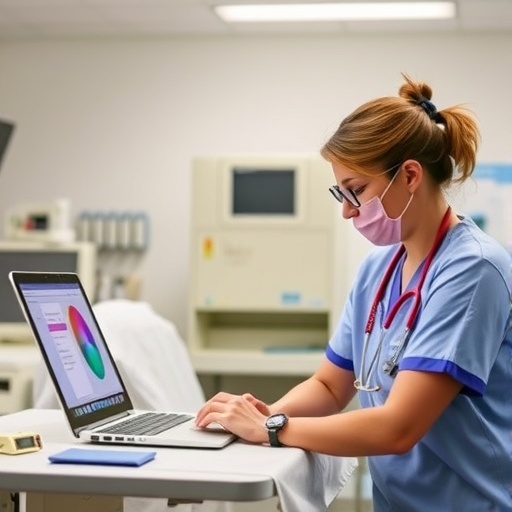In a groundbreaking study poised to reshape nursing education, researchers have unveiled a high-fidelity simulation program that leverages flipped learning methodologies for enhancing emergency management strategies concerning seizures among nurses. This innovative approach is particularly critical given the increasing incidence of seizure disorders globally, highlighting the urgent need for healthcare professionals to sharpen their emergency response skills. Traditional methods of teaching have often fallen short in preparing nurses for high-pressure scenarios, but this integrative model appears to make significant strides toward closing that gap.
The study, led by Ju and colleagues, was designed against the backdrop of the evolving nature of nursing education, where theoretical knowledge often fails to translate into effective clinical practice. Acknowledging that nurses are on the frontline during medical emergencies, the researchers sought to evaluate how a flipped learning framework—one that prioritizes active learning and hands-on experiences—could heighten proficiency in emergency situations. Their findings promise not just to refine individual competencies, but also to potentially enhance overall patient care and outcomes in real-world settings.
At the core of this simulation program is the dual focus on cognitive understanding and psychomotor skills. Nurses engaged with pre-recorded lectures and interactive content prior to participating in the simulation sessions. This preparatory phase enabled them to arrive at the simulation exercises equipped with foundational knowledge, thus allowing realistic and impactful practice during the simulations where they navigated through various seizure scenarios.
Simulators have been at the forefront of medical education, offering lifelike experiences that can’t be captured in a typical classroom setting. The study leveraged high-fidelity manikins equipped with responsive technology that mimicked physiological responses to various interventions. This immersive experience not only captivated participants but also heightened their engagement levels—transforming sterile learning into an exhilarating and informative challenge.
Evidence from the research indicates a marked improvement in nurse confidence and competence in managing seizure emergencies. Participants reported heightened enthusiasm and preparedness, suggesting that the flipped learning approach may catalyze a cultural shift in nursing education. This transition is critical, particularly given the substantial emotional and cognitive demands placed on nurses when faced with actual emergencies.
The mixed-methods design of the study provided a robust data set, combining quantitative metrics with qualitative feedback. Numeric assessments in skills proficiency revealed undeniable gains while open-ended surveys encapsulated personal narratives of growth and transformation. Such insights illuminated the psychological journey of nurses as they traversed from theoretical understanding to practical application, revealing how innovative educational designs can enhance mental preparedness.
Additionally, the implications of this study resonate beyond nursing education alone. As healthcare systems around the world grapple with the challenge of delivering timely and effective care, particularly in emergency settings, the insights gathered here can provide a blueprint for evolving curricula across various medical disciplines. It stands as a testament to the importance of adaptive learning approaches in responding to the dynamic needs of health care delivery systems.
Moreover, as healthcare continues to be impacted by rapid technological advancements, integrating simulation with technology-driven educational tactics could become increasingly vital. This study sets the stage for future explorations into emerging technologies and their role in shaping effective training methodologies. The potential to incorporate virtual reality or augmented reality simulations could further amplify the impactful nature of this pedagogical shift.
As the findings circulate within the academic and professional nursing communities, they prompt significant considerations around future training protocols. It invites educators to reflect on the effectiveness of existing models and encourages the adoption of innovative methodologies that prioritize experiential learning. By adopting these new approaches, healthcare education can elevate its standards and prepare professionals to navigate the complexities of patient care more effectively.
The importance of this study also highlights the role of collaborative research in generating significant advancements. The participation of various stakeholders, including nurses, educators, and researchers, demonstrates a holistic approach to addressing the challenges faced in nursing education. This collaborative effort is crucial as education systems work to align training with the clinical realities encountered by practitioners.
In summary, the effectiveness of the high-fidelity simulation program grounded in flipped learning is a notable stride in nursing education. As the research unfolds, it will be indispensable to monitor how these innovative practices are adopted across diverse educational settings and whether they yield long-term improvements in healthcare delivery. The future of nursing education may very well depend on such revolutionary strategies that prioritize not only knowledge retention but also the application of skills in life-threatening situations.
Ultimately, as the healthcare landscape continues to evolve, the significance of this research cannot be overstated. The integration of advanced simulation techniques with flipped learning underscores a critical evolution in nursing education that could set a new standard for how emergency management training is conceptualized and delivered. The report’s implications extend beyond academia, signaling the potential for real change in nursing practice across healthcare systems worldwide.
By emphasizing experiential learning, this innovative study fosters a climate where nurses can grow in confidence and capability, equipping them to respond to medical emergencies with finesse and expertise. In a profession where the stakes are often life and death, such advancements are not only welcomed but urgently needed.
Subject of Research: Effectiveness of high-fidelity simulation program based on flipped learning for nurses’ emergency management of seizures.
Article Title: Effectiveness of a high-fidelity simulation program based on flipped learning for nurses’ emergency management of seizures: a mixed-methods design.
Article References:
Ju, JK., Choi, O., Ahn, S. et al. Effectiveness of a high-fidelity simulation program based on flipped learning for nurses’ emergency management of seizures: a mixed-methods design.
BMC Nurs 24, 1330 (2025). https://doi.org/10.1186/s12912-025-03966-1
Image Credits: AI Generated
DOI: 10.1186/s12912-025-03966-1
Keywords: nursing education, flipped learning, high-fidelity simulation, emergency management, seizure management, competency-based education.




